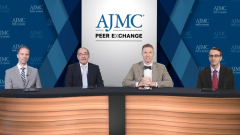
Emerging Therapies: Other Strategies and Important Considerations
Panelists discuss how targeted therapies for immunoglobulin A (IgA) nephropathy are advancing rapidly, with promising results from trials of B-cell modulating agents that inhibit APRIL/BAFF signaling and complement pathway inhibitors that address specific steps in the 4-hit cascade.
Episodes in this series

Novel Targeted Therapies in IgA Nephropathy: Paradigm Shift Toward Pathophysiologic Mechanisms
Therapeutic Evolution
Novel targeted therapies for IgA nephropathy (IgAN) represent a fundamental shift from broad immunosuppression to precision medicine approaches that address specific pathophysiologic mechanisms within the 4-hit cascade:
- Mechanistic targeting: Moving from symptom management and general anti-inflammatory approaches to therapies that directly address disease-specific pathways
- Reduced systemic effects: More selective interventions with potentially improved safety profiles compared with traditional immunosuppressants
- Biomarker-guided therapy: Emerging ability to match specific therapies to individual disease endotypes
First-Hit Targeted Therapies
- APRIL inhibitors: Monoclonal antibodies targeting APRIL (a B-cell stimulating factor) reduce production of galactose-deficient IgA1 (Gd-IgA1)
- Targeted enteric release corticosteroids: Act locally on mucosal-associated lymphoid tissue to modulate IgA1 production
- B-cell modulators: Selective approaches to reduce pathogenic B-cell subsets while preserving protective immunity
Second-Hit Targeted Therapies
- Specific cytokine inhibitors: Target key cytokines involved in autoantibody formation against Gd-IgA1
- Costimulation blockers: Disrupt T-B cell interactions required for autoantibody production
- Mucosal immune modulators: Address gut-kidney axis dysregulation contributing to aberrant immune responses
Third-Hit Targeted Therapies
- Fc receptor antagonists: Block binding of IgA immune complexes
- Glycan-targeted therapies: Interfere with immune complex formation and mesangial deposition
- Complement inhibitors: Target specific complement pathways involved in immune complex processing
Fourth-Hit Targeted Therapies
- Selective complement inhibitors: Target alternative pathway components specifically activated in IgAN
- Antifibrotic agents: Address progressive kidney scarring through novel mechanisms
- Endothelial protective agents: Preserve glomerular filtration barrier integrity
Clinical Implications
This targeted approach enables the following:
- More precise patient selection based on disease mechanisms
- Potential for combination therapies addressing multiple hits simultaneously
- Reduced reliance on systemic immunosuppression
- Improved therapeutic index with better efficacy and safety balance
The paradigm shift toward mechanism-based therapies promises to revolutionize IgAN management, potentially modifying disease course rather than merely managing symptoms and complications. This evolution represents a significant advancement in the field of glomerular diseases more broadly.
Newsletter
Stay ahead of policy, cost, and value—subscribe to AJMC for expert insights at the intersection of clinical care and health economics.










